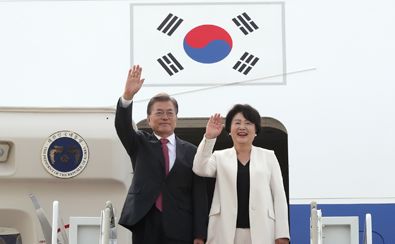South Korean President Moon Jae-in departed for Germany on Wednesday for the upcoming Group of 20 summit where he was expected to discuss ways to rein in North Korea's evolving nuclear and missile technologies with other global leaders.

His departure came one day after North Korea claimed to have had a successful test launch of its new intercontinental ballistic missile (ICBM).
Moon earlier told his security officials to seek cooperation with the United States and other allies to have the U.N. Security Council take necessary measures to condemn the North's latest provocation.
Tuesday's launch of the new claimed ICBM, Hwasong-14, marked the sixth missile test since the new South Korean president took office on May 10.
Accordingly, the South Korean president was expected to rally international support in condemning the North's latest missile provocation in his meeting with G20 leaders.
He is scheduled to hold three-way talks with U.S. President Donald Trump and Japanese Prime Minister Shinzo Abe on Thursday (German time).
The three-way meeting follows Moon's bilateral talks with his U.S. counterpart in Washington last week, in which the leaders agreed to strengthen the countries' joint deterrence against North Korean nuclear and missile threats.
The three-way talks with Japan's Abe are widely expected to focus on enhancing the countries' cooperation on ending North Korea's nuclear ambitions.
South Korea and Japan, both close allies of the U.S., have often let their bilateral ties deteriorate over historical issues that include Japan's territorial claim to a set of South Korean islets in the East Sea, called Dokdo in South Korea and Takeshima in Japan.
The Seoul-Tokyo relations are again at a low ebb after Moon hinted at renegotiating or scrapping a 2015 deal over Japan's sexual enslavement of Korean women during World War II.
The agreement, signed by Seoul's former conservative administration, is believed to be aimed at pardoning Japan's war atrocity once and for all, in exchange for 10 billion yen (US$8.85 million).
The new South Korean president said his people simply did not and could not accept the deal.
Still, he has said such issues must not keep the countries from advancing their cooperation on other and more urgent issues, such as North Korea's evolving nuclear and missile threats.
Moon and Abe are also set for bilateral talks, to be held on the sidelines of the G20 summit in Hamburg early Friday, Cheong Wa Dae officials said.
The South Korean leader is also expected to hold bilateral talks with a "number of other foreign leaders," possibly including China's Xi Jinping.
China, North Korea's largest communist ally, is considered to have more influence over Pyongyang than any other, singlehandedly accounting for more than 90 percent of North Korea's overall trade.
Both Moon and the U.S. president have repeatedly urged Beijing to do more to prevent North Korea from making any further provocations.
Moon is also expected to seek Germany's support in dealing with the provocative North.
His five-day trip to the European country will begin with a two-day stay in Berlin, where he will hold a bilateral summit with German Chancellor Angela Merkel, according to Cheong Wa Dae.
He will also hold talks with German President Frank-Walter Steinmeier.
He will head to Hamburg on Thursday to join the annual G-20 summit over the following two days. It will mark the first multinational forum attended by the new South Korean president.

